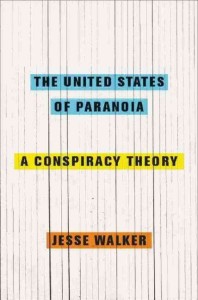 The United States of Paranoia: A Conspiracy Theory, by Jesse Walker, HarperCollins, 448 pages, $25.99
The United States of Paranoia: A Conspiracy Theory, by Jesse Walker, HarperCollins, 448 pages, $25.99
Circa 2009, in a fit of 1990s nostalgia that should make BuzzFeed proud — and motivated in part by a clunky Department of Homeland Security paper — some of the left decided that incidents like the murder of abortion provider George Tiller, the shooting death of a guard at the Holocaust Museum in Washington, DC, and the lingering rumor that Obama was a Muslim from Kenya meant that the right couldn’t handle a black, Democrat president without losing their Goddamned racist, fascist, conspiratorial minds. It wasn’t true, but it made great headlines and cable news concern-trolling. In a while the left cooled off a bit. (They didn’t even blame any right-wing pundits for the schooting at Sandy Hook Elementary school!) But the notion of a paranoid (loosely-defined) right remains (and will forever, if the Southern Poverty Law Center has anything to say about it).
Talking about paranoia or conspiracies is not as simple as Birthers, Truthers, or even the fair-is-fair point that the left has big fears, too. (Or that paranoia about the paranoid may count as paranoia!) There are a lot more baseless or exaggerated fears dwelling deep in a lot more humans than any partisan could ever admit. And, writes Reason magazine books editor Jesse Walker in his new book, that fear has been with us since before America was the United States.
To make our long history of hiding and screaming in terror easier to filter, Walker divides his types of conspiracy theories into five groups: the Enemy Outside (say, rogue Indians and scheming Catholics), the Enemy Within (Commies, Satanists, anyone quietly scheming), the Enemy Below (slave rebellions, populist uprisings), the Enemy Above (the state! And corporations, and Illuminati, and Bilderbergs, anyone powerful who secretly runs everything and may even be inciting the faceless mobs in their own supposedly organic outrages), and the Benevolent Conspiracy (angels, friendly aliens, and benevolent puppetmasters and societies). And there are scads of examples of each, surprising numbers for a book that isn’t about any of those one things. Indeed, there is so much of interest in United States of Paranoia that its biggest problem might just be a reader’s desire to stop a minute and talk even more about this or that specific thing. Any chapter could have made a whole, adsorbing book in itself.
Because while strolling through American history, Walker manages to mention almost every seemingly random, fascinating bit of human endeavor possible, including, but not limited to: the myth of the superchief Indian, the meaning of Invasion of the Body Snatchers, the multilayered interpretations of Rambo, aliens, Satan´s influence on Your Children and Women, plenty of communists, fears of commie and gay conspiracies, real conspiracies like COINTELPRO, and a bracing defense of (most) militias. Indeed, one of Walker’s most fascinating chapters is the one where he explores the New World Order/Illuminati fears that bridged ´90s militia and black nationalist movements.
The simplest, most convenient libertarian takeaway in these pages is that a lot more people are paranoid than your average loony — say, the cheap caricature of a libertarian writing anti-government manifestos, then piloting a plane into an IRS building (or something). We´re not alone, fellow residents of government watch lists! That´s the thing about United States of Paranoia, anyone, libertarian or not, could read it in two ways: optimism that the oft-cackled critique of ¨you’re paranoid!¨ can be directed at at least every other human; pessimism, or actual alarm, that this many people over this many years have let their fears turn into sometimes-real monsters that kill or at least ruin lives.
But instead of worrying about that, maybe just follow Walker´s lead, and enjoy the journey — the often-creative myth-making and the psychology of paranoid tales and what they say about us. Walker´s a big fan of the late Robert Anton Wilson, and another of his best chapters discusses Wilson and the Discordians and other folks who got into conspiracy theories for their weirdness, not for any Grand Explanation of All Things. (Paranoia as art! Finally an understanding of my inability to be be outraged over Alex Jones, not matter how horrible he is for libertarianism!)
Walker´s writing style is brainy, but off-kilter and quietly funny, like the man himself. Any creeping libertarian propaganda is in short, subtle supply. There’s nothing much here to turn off the readers who might disagree with Walker’s politics. The story he tells is captivating, human, bizarre, and endlessly surprising, in short, accessible to all but the most ardent Southern Poverty Law Center employee or sincere user of the word “sheeple.”
The entire book filled me with a strange fondness for America, simply because of the strange creativity of many of these myths. Yes, paranoia run amok can cause real casualties (ask Giles Cory, or parents in Kern County, California). But seeing patterns, conspiracies, and cabals is normal; as is building up our enemies, be they small, or entirely imaginary, into something vast and all-powerful and terrifying. This is who we are, we humans. And Walker’s exploration of the normalcy of this fear should make us all a little less paranoid.
But it won’t.
 I was fortunate enough to get a PDF preview of Walter Block’s new book, Legalize Blackmail, before it was published, and today I was delighted to receive my hardcover copy in the mail.
I was fortunate enough to get a PDF preview of Walter Block’s new book, Legalize Blackmail, before it was published, and today I was delighted to receive my hardcover copy in the mail.


